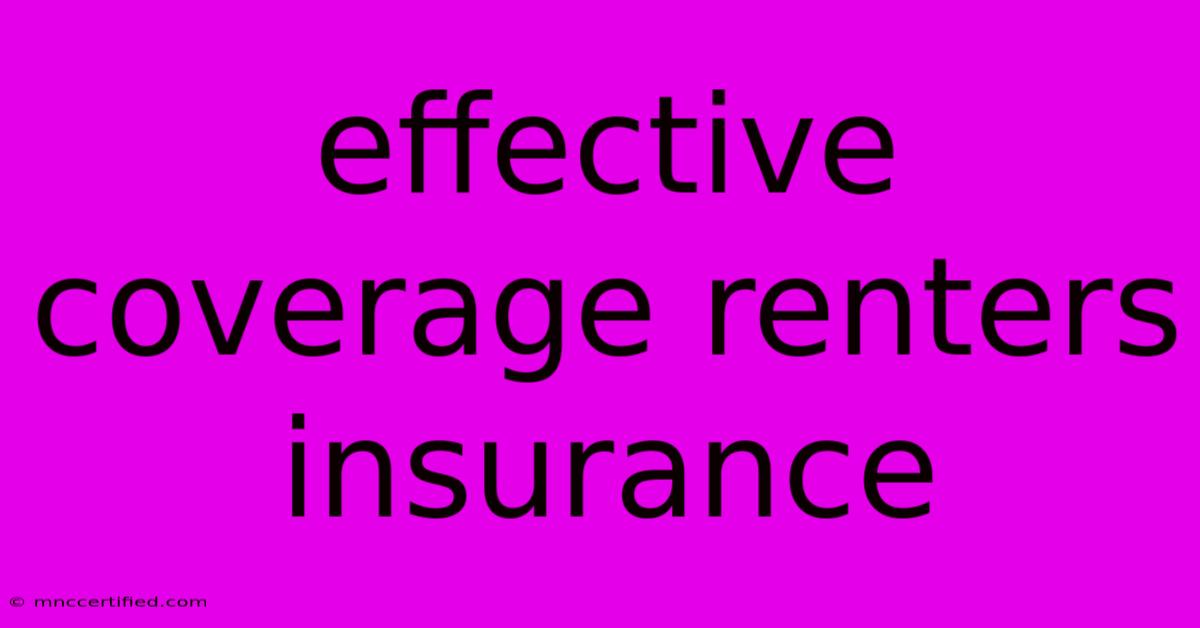Effective Coverage Renters Insurance

Table of Contents
Unlocking Peace of Mind: Effective Coverage for Renters Insurance
As a renter, you're responsible for your belongings, even if you don't own the building itself. That's where renters insurance comes in, providing crucial financial protection against a range of unexpected events. But with so many policy options available, how do you choose the effective coverage that truly safeguards your assets and lifestyle?
Understanding the Basics: What Does Renters Insurance Cover?
Renters insurance acts as a safety net, providing financial compensation for losses due to:
- Fire and Smoke Damage: Imagine a kitchen fire, engulfing your belongings. Renters insurance covers the cost of replacing your personal property.
- Theft: A break-in can leave you devastated. Renters insurance helps recover the value of stolen items, including electronics, furniture, and jewelry.
- Water Damage: Leaky pipes or sudden storms can cause significant water damage. Your policy covers the cost of repairs and replacing damaged property.
- Liability: If someone is injured on your property, renters insurance protects you against legal claims and medical expenses.
Key Components of Effective Renters Insurance Coverage
Beyond basic coverage, consider these important factors for effective renters insurance:
- Personal Property Coverage: Choose a policy with enough coverage to replace all your belongings at their current value. Consider using a home inventory app to document your possessions and their worth.
- Liability Coverage: Select a policy with sufficient liability coverage to protect you from lawsuits in case someone is injured on your property.
- Additional Living Expenses: In case of a covered event that makes your rental unit uninhabitable, your policy should cover the cost of temporary accommodation and other essential living expenses.
- Valuables Coverage: For high-value items like jewelry, art, or electronics, consider additional coverage through a separate rider or endorsement.
- Deductible: The deductible is the amount you pay out-of-pocket before your insurance kicks in. A higher deductible means lower premiums, but you'll bear more of the initial cost in case of a claim.
- Flood Coverage: Standard renters insurance typically doesn't cover flood damage. If you live in a flood-prone area, consider purchasing separate flood insurance.
Tips for Finding the Right Coverage
- Shop around: Compare quotes from different insurers to find the best value for your needs.
- Consider your risk factors: Factor in the value of your belongings, the crime rate in your area, and your individual risk tolerance.
- Ask questions: Don't hesitate to ask your insurer about specific coverages, exclusions, and policy details.
Beyond the Policy: Maintaining Effective Coverage
- Update your inventory: Regularly update your home inventory to reflect any new purchases or changes in value.
- Keep your policy current: Review your policy annually and adjust coverage as needed to reflect changes in your belongings, living situation, or risk factors.
- Communicate with your insurer: Notify your insurer promptly about any changes in your living situation or any incidents that could affect your coverage.
By choosing effective coverage and staying informed about your renters insurance, you can create a solid foundation for financial security, giving you peace of mind to focus on enjoying your home.

Thank you for visiting our website wich cover about Effective Coverage Renters Insurance. We hope the information provided has been useful to you. Feel free to contact us if you have any questions or need further assistance. See you next time and dont miss to bookmark.
Featured Posts
-
40m Price Tag City Or Liverpool For Fulham Player
Nov 11, 2024
-
India Vs Sa 2nd T20 I Chakaravarthys 5 Wicket Haul
Nov 11, 2024
-
49ers Defeat Buccaneers 23 20 Five Observations
Nov 11, 2024
-
Wolf Halls Return A Casting Loss
Nov 11, 2024
-
Athletic Trainer Liability Insurance
Nov 11, 2024